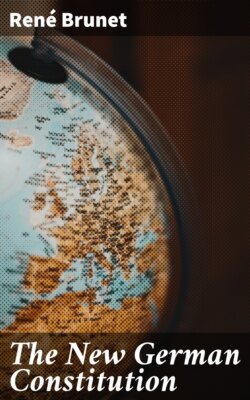Читать книгу The New German Constitution - René Brunet - Страница 15
На сайте Литреса книга снята с продажи.
CHAPTER II
TOWARD A UNITARY STATE
ОглавлениеTable of Contents
The first question with which the National Assembly found itself confronted and which had to be decided was whether the German Reich was to remain a federated state or whether it was to become a unitary state; or, supposing that an intermediate solution were obtainable, to what extent it could partake of the characteristics of one or the other type of state.
The unitary state possesses an undivided and exclusive sovereignty. There is unity of law, of power and of will with one Constitution, one administration and one authority. The type of such a unitary state is France. To the unitary state is opposed the composite state in which co-exist several sovereignties, those of the member states as well as that of the central government.
For, there are two principal types of federated states: the confederation of states, which has as its basis an international treaty and the expression of whose will is only the sum total of the wishes of its member states; each component state retains its sovereignty, but certain attributes of that sovereignty are exercised in common through the confederate organs. The other type is the federal state, which has as its basis a constitution and which possesses a sovereignty necessary for the performance of its duties, the exercise of its rights and its independent will.
But it goes without saying that these concepts are essentially relative. Between the unitary state and the confederation of states lies a whole series of state types, one merging by imperceptible nuances into the other, types which differ one from another according to the extent to which the member states are called upon to collaborate in the formation of the common will. Further, the federal state is never static, in the sense that its institutions never cease to change, tending either toward unitarism—that is to say, toward the tightening of the federating bonds or even toward their disappearance through the complete fusion of the component states; or tending toward federalism, that is to say, toward a loosening of the bonds, or even their disappearance by the dissolution of the composite state.
There are undoubtedly in every composite state at the same time tendencies of both kinds. Theoretically they may even act as balances to one another. But this equilibrium is never completely realized and according as one of these tendencies gains over the other, the composite state tends more or less rapidly toward unitarism or toward federalism.[9]
Before the war the German Empire was a federated state with unitary tendencies. Since the war these tendencies have strengthened. For, the downfall of the Empire and its army, the economic catastrophe which followed the war and aggravated the revolution, the separatist tendencies which have shown themselves here and there on German soil, and the financial burdens which have weighed on Germany all have convinced its leaders that to save Germany and to build it up there was but one means possible—to concentrate all the powers in the hands of those at the helm of the Empire, and as a consequence, to diminish to the greatest possible measure the powers of the member states (if not actually to suppress them completely) in order to give all efforts available a single direction and to utilize them to the maximum, avoiding at the same time all unproductive energy and all scattering of forces.
By what means did this evolution manifest itself? How far did the Constituent Assembly go toward unitarization of the Reich? Will the German Reich remain a federated state?
To answer these questions we must successively examine: (a) whether the states still exercise self-determination and particularly whether they remain masters of their territory; (b) whether the states retain the right to give themselves their individual constitutions and laws and to govern themselves; (c) and finally whether the states participate, as such, in the formation of the will of the Reich. This last problem will be examined in studying the organization of the public powers, particularly those of the Reichsrat. The present chapter will be devoted to the study of the first two considerations.
